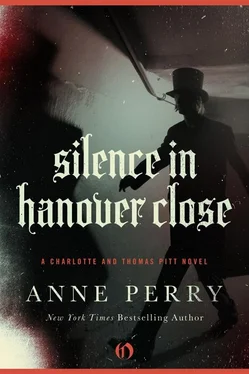Anne Perry - Silence in Hanover Close
Здесь есть возможность читать онлайн «Anne Perry - Silence in Hanover Close» весь текст электронной книги совершенно бесплатно (целиком полную версию без сокращений). В некоторых случаях можно слушать аудио, скачать через торрент в формате fb2 и присутствует краткое содержание. Жанр: Исторический детектив, на английском языке. Описание произведения, (предисловие) а так же отзывы посетителей доступны на портале библиотеки ЛибКат.
- Название:Silence in Hanover Close
- Автор:
- Жанр:
- Год:неизвестен
- ISBN:нет данных
- Рейтинг книги:3 / 5. Голосов: 1
-
Избранное:Добавить в избранное
- Отзывы:
-
Ваша оценка:
- 60
- 1
- 2
- 3
- 4
- 5
Silence in Hanover Close: краткое содержание, описание и аннотация
Предлагаем к чтению аннотацию, описание, краткое содержание или предисловие (зависит от того, что написал сам автор книги «Silence in Hanover Close»). Если вы не нашли необходимую информацию о книге — напишите в комментариях, мы постараемся отыскать её.
Silence in Hanover Close — читать онлайн бесплатно полную книгу (весь текст) целиком
Ниже представлен текст книги, разбитый по страницам. Система сохранения места последней прочитанной страницы, позволяет с удобством читать онлайн бесплатно книгу «Silence in Hanover Close», без необходимости каждый раз заново искать на чём Вы остановились. Поставьте закладку, и сможете в любой момент перейти на страницу, на которой закончили чтение.
Интервал:
Закладка:
“Very well, Mr. Pitt,” she agreed. “If you really believe it is so serious. I shall discuss it with no one. You may cease to worry about it.” She looked at him levelly, her round, clever eyes very grave. “Good gracious, Mr. Pitt-your concern is a trifle unnerving!”
Outside again in the gray street he turned and walked south. He must find the woman in cerise. He had already exhausted the easier avenues, the hotels and theaters where she would have been most likely to meet her clients. He had questioned the doorkeepers, the prostitutes who might have been her rivals, as well as the pimps and madams. They either did not know her or would not say. It all confirmed what he imagined from the beginning, that she was a spy, not a woman earning her living from prostitution. She was not interested in general trade, only certain men in particular. And she had taken great care not to be traced.
Finding Cerise would be a matter of laborious, detailed police work. He knew at least one place which she had patronized several times, and now he had a close and unusual description. No one in the business of sexual favors for hire was likely to help him further; all the middlemen reaped their profits from silence. But there were always people in a London street who were almost invisible, people who might remember, who made their livelihood from passersby, their hungry eyes watching each one for even the tiniest signs of willingness to buy.
He stepped over to the curb and raised his arm, shouting to a hansom as it plodded along Park Lane through the thickening mist. There was snow in the wind. He climbed in and gave the address of the hotel where he had found the doorman who remembered Cerise, sitting back to wait out the slow, cold journey. This was not the best time to begin-the vendors he wanted would be the ones who worked at night-but he had nothing else to pursue, and there was an urgency inside him.
He stopped short of the hotel itself and left the cab on the comer, opposite a stall where a man wearing a white apron and a black hat with a ribbon round it was selling hot eels. Beside him, a girl ladled out thick pea soup at a halfpenny a cup.
The aroma drifted on the wet air and Pitt automatically reached in his pocket. He had never acquired the native Londoners’ taste for eels, but he was partial to pea soup. A red-faced woman was before him in the queue, but after she was served he produced his halfpenny and took the hot cup gratefully. The liquid was thick and a little lumpy, but the flavor was rich and its warmth rippled through him, creating a tiny heart of strength inside.
“You here in the evenings?” he asked casually.
“Sometimes, in the summer wiv ve eels,” the man answered. “Vis time o’ year anyone wiv an ’ome ter go to is in it! Vem as ’asn’t usual don’t ’ave money neither.”
“Who’d be here in the evening?”
The man went on ladling eels. “Wot time yer talkin’ abaht? Early on, till eight or nine, ’er.” He gestured to a small girl about fifty yards up the pavement, who stood shivering in the cold, a box of sweet violets by her bare feet. She might have been ten or eleven years old.
“I’ll take another cup of soup.” Pitt gave the man a second halfpenny and took the cup from the girl. “Thank you.” He turned to walk away.
“Hey! I want the cup back!” the man shouted behind him.
“You’ll get it,” Pitt said over his shoulder, “when it’s empty.” He approached the flower girl. She was only a few years older than Jemima, with a pinched face and few underclothes beneath her plain dark dress and faded shawl. Her feet were mottled red and blue with extreme cold.
He put the cup of soup down on the pavement and fished in his pocket for two more pennies.
“I’ll have two bunches of violets for my wife,” he said, holding out the coins.
“Thank you, sir.” She took the pennies, glancing at him out of clear blue eyes, then stole a glance at the steaming soup.
He picked it up and took a sip, then set it down again.
“I’ve bought more than I can eat,” he said. “You can finish it if you like.”
She hesitated; nothing came into her life without a price.
“I don’t want it,” he repeated.
Very carefully she reached out her hand and picked it up, still watching him.
“Have you been on this street long?” he asked, knowing as he said it that she was probably too young to be any help to him. But he had bought the soup without thinking of Cerise.
“Two year,” she replied, sipping soup with a slurp and sucking it round her mouth.
“Is it busy in the evenings?”
“Fair.”
“Are there other traders here?”
“Some. ’Bout two or free.”
“Who? What do they sell?”
“There’s a woman wot sells combs, but she goes early. Girl wot sells matches sometimes. An’ o’ course there’s ’im wot sells ’ot plum duff; ’e’s ’ere of an evenin’. An’ sometimes there’s patterers. They moves abaht, mostly from Seven Dials way, ’cause vat’s w’ere the printers is.”
He did not need to question her, he knew what running patterers were: men of prodigious memory and usually a nice turn of humor, who sold red-hot news, generally of crime and seduction. And if there was nothing sufficiently grisly in truth, then they were not above inventing something, replete with detail, and frequently showing pictures.
“Thank you,” he said civilly, picking up the empty cup. “I’ll come back this evening.”
He went home for dinner and gave Charlotte, to her surprise and delight, both bunches of violets. Then at about ten o’clock he forced himself to go out again into the freezing fog.
It was a vile night, and there was no one in the street outside the hotel except a fat, pasty-faced youth selling hot plum duff, a cooked dough filled with sultanas and kept at a good temperature with layers of steaming cloth. The youth was well patronized by the men leaving the hotel, but after half an hour of standing and stamping his feet to keep the circulation going and a couple of brisk turns round the block, Pitt had seen none of the women who used the hotel rooms for their trade.
He questioned the plum duff boy and learned nothing at all. The boy had been there five years, he thought, but he had never noticed a woman in cerise.
The following night he came again, but he was no more successful, and the night after that he went instead to the Lyceum Theatre. He spoke to a seller of peppermint water who had seen someone in brilliant pink but could not recall her height, and rather thought she had had red hair.
Then after midnight, angry with the futility of it all, his feet numb in the settling snow and with his collar up round his ears, he moved forward amid the din of shouting, laughter, and occasional jeers as the theater turned out. He saw a youth selling ham sandwiches and decided to buy one. He was not hungry, but he liked ham. He pushed his way through the throng, jostled by elbows and plump bustles, assaulted by the smell of perfume, sweat, and beery breath till he reached the sandwich man in the street beyond. There was a threepence in his pocket but his fingers were too cold to grasp it.
The youth looked at him expectantly. He was thin and there were hectic spots of color in his cheeks. It was a wretched living and Pitt knew it, standing outside in all weather, often half the night, and to make enough to survive they had to buy the meat on the bone and cook it themselves, then cut the sandwiches. He made less than a halfpenny profit on each sandwich sold, and Pitt knew that anything spoiled or lost could wipe out the day’s takings.
“I’ll have two, please.” He gripped the threepenny bit at last and produced it. The youth gave him two sandwiches and a penny change.
Читать дальшеИнтервал:
Закладка:
Похожие книги на «Silence in Hanover Close»
Представляем Вашему вниманию похожие книги на «Silence in Hanover Close» списком для выбора. Мы отобрали схожую по названию и смыслу литературу в надежде предоставить читателям больше вариантов отыскать новые, интересные, ещё непрочитанные произведения.
Обсуждение, отзывы о книге «Silence in Hanover Close» и просто собственные мнения читателей. Оставьте ваши комментарии, напишите, что Вы думаете о произведении, его смысле или главных героях. Укажите что конкретно понравилось, а что нет, и почему Вы так считаете.












